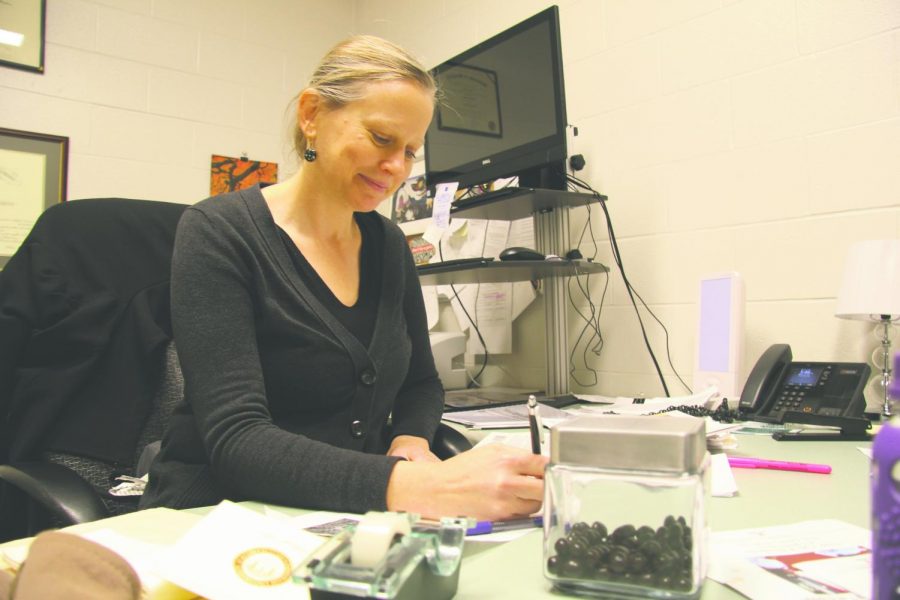Breaking Stereotypes
Social science degrees could make you successful in the modern day workplace.
Kelly Ryan said half of history majors attend graduate school in the interest of entering other careers, “The same skills that kind of brought them an interest in history create a lifetime of curiosity that makes them keep moving through careers by attending graduate school.”
December 9, 2017
Students who earn Social Science degrees often enter careers that are different than the name of their degrees imply. IU Southeast’s School of Social Sciences offers undergraduate degree programs in criminology and criminal justice, history, international studies, journalism, neuroscience, political science, psychology and sociology. IU Southeast offers resources to inform students pursuing one of these degrees about their career options.
According to Quinn Dauer, assistant professor of history and international studies at IU Southeast, students should be considering potential careers as early as possible. Dauer was a history major and wants students who are pursuing social science degrees to learn from his experience.
“You want to start thinking about these things now, much more so than when I was in school and I got to be, you know, late junior year, early senior year and I’m thinking, ‘OK. What do I want to do now?’ and then plan from there,” he said.
IU Southeast offers career courses for all but two of its programs. These courses aim to provide information about the ways social science students can transfer the skills they’ve learned to a professional setting.
“It’s better to start thinking about this as a freshman, but particularly when you enter the major as a sophomore to go through [the careers courses] and that class will help you think about, how you apply the skills that you learn as a historian,” Dauer said. “How do you market yourself? What kind of jobs are available to history majors? And, contrary to popular belief, lots of history majors end up going into business.”
The American Historical Association backs up Dauer’s statements. 18 percent of history majors go into education, 15 percent earn management positions in business and 11 percent enter legal occupations.
The American Sociological Association provides similar data about sociology majors. While 26.5 percent of people with a bachelor’s degree in sociology work full-time as counselors, psychologists or social service workers, 14.4 percent enter full-time management positions.
Dauer added that the skills learned in social sciences class are portable.
“If you’re a history major, the stereotype is you read a lot and you write a lot and there’s some truth to that stereotype,” Dauer said. “What better major to practice those communication skills than as a history major, right? Because you’re constantly writing papers, you’re constantly giving presentations about your papers and communicating those findings to people who may not know what it is that you’ve researched.”
Kelly Ryan, dean of social sciences, addresses these alternative possibilities in the career course she teaches for history majors. She said she has seen social sciences majors branch out into a variety of diverse career paths.
“History majors and philosophy majors don’t go on to be historians and philosophers,” Ryan said. “[Students] are interested in history or philosophy, I would argue, because they’re really interested in analysis. They’re really interested in context, understanding different points of view, understanding the world and how it came to be the way it was. And so those kinds of people you can’t find everywhere.”
James Fabel, a senior history major, is an example of a student who plans to use his degree in a similar way.
“I’m studying history because I’ve always been interested in stories of the past. I may not actually use it for direct purposes related to the degree,” Fabel said. “I may just go into real estate or apply for law school.”
Dauer says that it is not unusual for social science students to go on to law school.
“Now you can do other things than teach or go into business,” Dauer said. “You can, if you’re really interested in history, go into public history, so you can work in museums, you can work at historical sites giving tours and these sorts of things. You could become an archivist, someone who orders these historical documents that are preserved in county records and things of this nature, so you can go into the public spectre there…Lots of politicians were at one time history majors.”
Earning a social sciences degree can lead to a variety of careers in business, law and education. Apart from a multitude of career paths made available, one of the most valuable payoffs of one of these degrees is the ability to harness curiosity that produces inquisitive members of any workforce.


